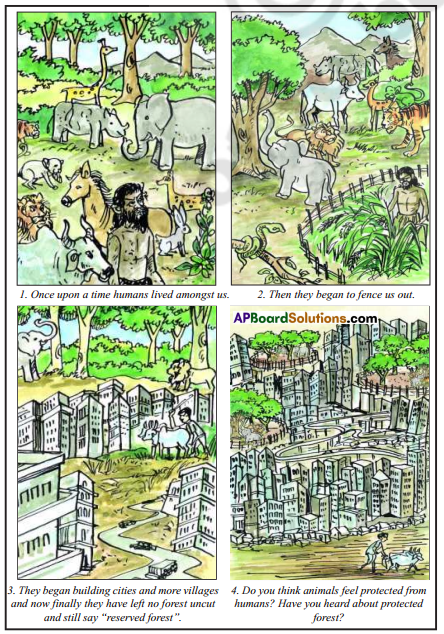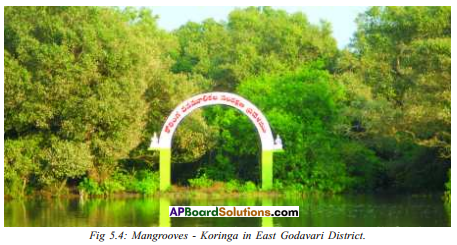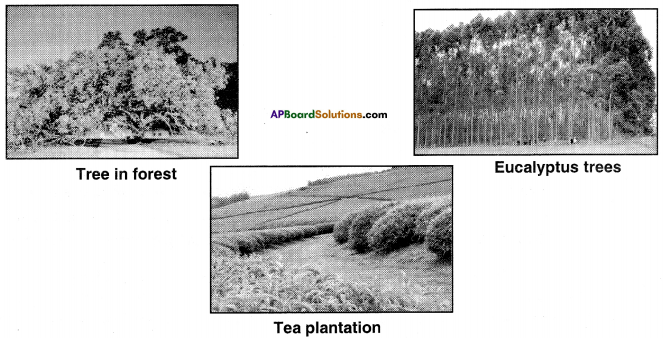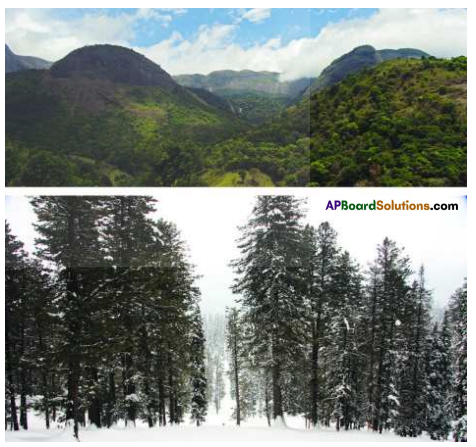Andhra Pradesh Board Class 8th Social Studies Chapter 5 Forests Using and Protecting Them Textbooks Solutions PDF
Andhra Pradesh State Board STD 8th Social Studies Chapter 5 Forests Using and Protecting Them Books Solutions with Answers are prepared and published by the Andhra Pradesh Board Publishers. It is an autonomous organization to advise and assist qualitative improvements in school education. If you are in search of AP Board Class 8th Social Studies Chapter 5 Forests Using and Protecting Them Books Answers Solutions, then you are in the right place. Here is a complete hub of Andhra Pradesh State Board Class 8th Social Studies Chapter 5 Forests Using and Protecting Them solutions that are available here for free PDF downloads to help students for their adequate preparation. You can find all the subjects of Andhra Pradesh Board STD 8th Social Studies Chapter 5 Forests Using and Protecting Them Textbooks. These Andhra Pradesh State Board Class 8th Social Studies Chapter 5 Forests Using and Protecting Them Textbooks Solutions English PDF will be helpful for effective education, and a maximum number of questions in exams are chosen from Andhra Pradesh Board.Andhra Pradesh State Board Class 8th Social Studies Chapter 5 Forests Using and Protecting Them Books Solutions
| Board | AP Board |
| Materials | Textbook Solutions/Guide |
| Format | DOC/PDF |
| Class | 8th |
| Subject | Maths |
| Chapters | Social Studies Chapter 5 Forests Using and Protecting Them |
| Provider | Hsslive |
How to download Andhra Pradesh Board Class 8th Social Studies Chapter 5 Forests Using and Protecting Them Textbook Solutions Answers PDF Online?
- Visit our website - Hsslive
- Click on the Andhra Pradesh Board Class 8th Social Studies Chapter 5 Forests Using and Protecting Them Answers.
- Look for your Andhra Pradesh Board STD 8th Social Studies Chapter 5 Forests Using and Protecting Them Textbooks PDF.
- Now download or read the Andhra Pradesh Board Class 8th Social Studies Chapter 5 Forests Using and Protecting Them Textbook Solutions for PDF Free.
AP Board Class 8th Social Studies Chapter 5 Forests Using and Protecting Them Textbooks Solutions with Answer PDF Download
Find below the list of all AP Board Class 8th Social Studies Chapter 5 Forests Using and Protecting Them Textbook Solutions for PDF’s for you to download and prepare for the upcoming exams:8th Class Social Studies 5th Lesson Forests: Using and Protecting Them Textbook Questions and Answers
Improve your learning
Question 1.
Do you agree with the following statements? Give reasons for your agreement or Contradiction.
a) The notion of private property is important to protect the forest.
b) All forests need to be protected by human beings.
c) Over the centuries most people living on earth have reduced their dependence on forest for their livelihood.
Answer:
a) I agree with this statement. They were sent out of their homes and they lost that ‘ours’ feeling.
b) I agree with this statement. The trees and human beings are interdependent. So all forests need to be protected by human beings.
c) Yes, I agree with this. Many other kinds of employment and business opportunities were created on the earth. So the dependence on forests is reduced.
Question 2.
Create a timeline to show the major changes in use of forest over centuries. It may be necessary to look at your textbooks from previous classes.
| Event | Changes affecting tribal life | Impact on forest |
| Emergence of agriculture | ||
| Arrival of the colonial rulers | ||
| Government rules |
Answer:
| Event | Changes affecting tribal life | Impact on forest |
| 1. Emergence of agriculture | Due to this the tribals changed their traditional foods, and began to cultivate crops like cereals, grains etc. | Due to this tribals started shifting or podu cultivation. Forest land changed as agricultural land, but they took care to ensure the regeneration of animals and trees. |
| 2. Arrival of the colonial rulers | After their arrival the tribals lost their control and rights over the forests. The laws restricted the customary rights of tribals and uses of forests. They became homeless. | Forests were under the control of Britishers and Forest Department. The land was handed over to farmers and zamindars. Britishers consumed much wood as the industries were developed. |
| 3. Government rules | Things did not really change for the better of the tribal people even after independence. The govt, continued to follow the British forest policy. As a result of these policies the condition of the tribal people continued to worsen. | In 1988, the government declared National Forest Policy. The primary task is to associate the tribals in the protection and regeneration of forests. This led to Joint Forest Management (JFM). Next the Parliament passed Forest Rights Act in 2006 and restored the tribals rights on forests. At last the forests came into the hands of tribals. |
Question 3.
Based on the details given in the above text, or from what you already know about the forests, compare the type of forest that is closest to your area of living on the following aspects.
| Density of trees | Types of trees found | Special features of trees |
Answer:
Ours is a Maredumilli village in East Godavari district. Our forest is as follows.
| Density of trees | Types of trees found | Special features of trees |
| 650 to 750 trees per acre | 1) Maredu | – called as Bilwavriksh; favourite of Lord Shiva. |
| 2) Peepal | – favourite of Lord Vishnu. It has more electromagnetic power. | |
| 3) Neem | – It is a form of energy. We treat it as ‘Amma’. | |
| 4) Amla | – Medicinal plant (Lord Vishnu). | |
| 5) Teak | – Hard wood; used for household purpose. | |
| 6) Devdar | – It is descended directly from ‘Devlok’. | |
| 7) Sal | – Hard wood; favoured by Vishnu; best for construction. |
Question 4.
Observe the map of forests in Andhra Pradesh and find out which district (s) has/have the maximum forest covered area?
Answer:
Visakhapatnam, East Godavari, Srikakulam and Prakasam districts have the maximum forest covered areas in our state.
Question 5.
A few children in a school participated in Vanamahotsavam programme and they planted some saplings. How do you respond to this?
Answer:
I appreciate this action very much. The children’s participation in this brightens the future of the country. But they should take care of their plants till they grow.
Question 6.
Read the paragraph under the heading ‘Forests of Andhra Pradesh’ and answer the question:
You read about some of the important kinds of forests in our state But how large are our forests? Are they increasing or decreasing? Let us find out. About 64,000 sq kilometres of the state are declared as forest by the government. This is about 23% of all land in the state.
However, all this is not really forested as only about 16% of our land has tree cover to qualify as forest. This means that is about 7% of our forest lands are open grounds and with very few trees. Even this forest cover is dwindling due to felling, encroachment, mining etc. Every year about one hundred sq kilometres of forests are lost in our state
What suggestions do you have for increasing the forest cover in our state?
Answer:
- Government should adopt social forestery scheme.
- Plantations should be taken in bare lands in forests.
- Consumption of forest products should be minimised.
- Renewable sources of energy should be invented.
- Forests should be protected from illegal activities.
- Awareness should be created about the necessity of forests among the common people.
- Plantations should be taken in the area of used up mines.
Question 7.
Locate the various places mentioned below different photographs of forests given in this chapter in an Atlas. What similarities and differences can you find among them?
Answer:
Similarities & Differences
| Name of the Forest | Physiographic conditions | Location | Trees |
| 1. Evergreen Forests | Regions which get very high rainfall and also have a very warm climate. | Equatorial regions or regions like Kerala and Andamans in India have evergreen forests. We do not have such forests in our state. | Dense forests with a very large variety of trees. Jamun, canes, bamboos, kadam etc. are some characteristic trees. |
| 2. Decidious Forests | These grow in regions when it rains in only some months and is warm and dry during most of the year. | Most of the forests of our state fall in this catageory. | Vegi, Ageisa maddi, Billu Neem, Teak, Velaga, Yepi, Buruga and Moduga etc. |
| 3. Thorny Forest | These grow in very dry areas with little rainfall and high temperatures. | These are located in Y.S.R. Kadapa, Chittoor Anantapur districts in our state. | Babul (Thumma) Balusu, Regu, Sandal Neem etc. |
Question 8.
What are the differences between Ever green forests and Deciduous forests?
Answer:
Difference between Evergreen forests and Deciduous forests:
- Evergreen forests: Evergreen plants in evergreen forests have leaves or needles that stay on the plant throughout all of the seasons. This does not mean that the needles or leaves never die or fall off. It means that when they do, they are replaced by new ones and the plant is never without greenary.
- Deciduous forests: Deciduous trees in deciduous forests lose their leaves flow September onwards, with some trees, this is accompanied by stunniodelus autumn colours. This happens at different points throughout the autumn, depending upon, the species of tree and weather at the point that this occurs.
Question 9.
Observe the pictures and write a comment.
Answer:
Tragically, human beings operate under the belief, that they have the right to do what they please to animals.
On the earth, the plant kingdom and the animal kingdom appeared first, before human kingdom. But now the later occupied more land on the earth. So the forests and wild life are to be protected.
Additional Information:
Mineral kingdom
↓
Plant kingdom
↓
Animal kingdom
↓
Human kingdom
8th Class Social Studies 5th Lesson Forests: Using and Protecting Them InText Questions and Answers
Question 1.
You have read about forests and people living forests in the previous classes. Can you recall some of them and talk about people who live in the forests? (Textbook Page No. 49)
Answer:
“Good morning all of you. Forests are lifeline of the lives. The area of forest should be 33% of the area of any country. But in India it is 23% only. These figures show our critical condition. Adivasis are 8% of our total population. Approximately 60% of them live in forests. They lead their lives in the lap of nature. Their traditions, customs, religious rituals, groups, agriculture – in every issue, they are different from others. Their welfare is our welfare. Save trees, they save us. Thank you one and all”.
Question 2.
What is a forest? There can be many ways of defining a forest. Write a definition of forests. Then discuss jointly in the class and write down points which seem to be correct to most students. (Textbook Page No. 50)
Answer:
A large tract of land covered by trees is called a forest.
Definitions:
- A forest is best defined as an ecosystem or assemblage of ecosystems dominated by trees and other woody vegetation.
- A place where the environment is covered from all sides with trees and wildlife means.
Correct points:
- It is ecosystem.
- It is dominated by trees.
- There are another woody vegetations also.
- Its place is covered with trees, from all sides.
- There is wildlife also.
Question 3.
Find out how the mangrove trees adapt to the special conditions of sea coasts.
(Textbook Page No. 54)
Answer:
Mangroves, like desert plants have special adaptations for growing in low moisture and high salt conditions.
One special strategy for coping with high concentrations of salt is special salt – excreting glands on leaves.
Another is exclusion of salt from entering roots with water uptake. They have specialised aerial breathing roots known as pneumatophores.
Question 4.
You may remember reading about Equatorial forests in Nigeria. What are the main differences between the forests of Andhra Pradesh and the Equatorial forests? (Textbook Page No. 54)
Answer:
| Forests of equatorial regions | Forests of Andhra Pradesh |
| 1. These are extended on either side of the equator. | 1. These are only to the north of the equator. |
| 2. These are highly densed. | 2. These are less densed. |
| 3. The ground is wet and swampy. | 3. The ground is semi wet and semi dry. |
| 4. More species are found here. | 4. Limited species are found here. |
| 5. These are not fit for transport facilities. | 5. These are fit for transport facilities. |
Question 5.
Do you think there is any difference between a plantation of Eucalyptus trees or tea shrubs and a forest? Discuss in the class. (Textbook Page No. 57)
Answer:
Forest trees grow in both height and breadth. The diameter at the top should be more or less equal to its height.
Eucalyptus trees are long, but at the top they are not broad enough. The plantations in tea estates are grown upto a height of 3 to 4 feet. Otherwise, it will be useless. So I think there is a difference between these three varieties.
Question 6.
What was the difference between the protection of forests by the tribal people and by the Forest Department? (Textbook Page No. 58)
Answer:
Tribals treated the forest as their mother. Their birth, life, death-every event was in the laps of forests. They felt no difference between them and forest. So they didn’t cause any harm or loss to the forests. In agriculture also they took necessary safety measures.
But the Forest Department officials usually belonged to distant and rich communities. They regarded the tribal people as ignorant and dangerous. They had no positive feeling about the forests.
This is the difference between protection of forest by the tribal people and by the Forest Department.
Question 7.
Can each of you draw a picture of a forest and compare them? (Textbook Page No. 49) Answer:
Answer:
In some pictures the forests are dense.
In some pictures there are gaps between tree trunks.
In some pictures some plain ground is visible in the forest.
Question 8. Write a caption on the above cartoon in the contest of forest. (Textbook Page No. 50)
Write a caption on the above cartoon in the contest of forest. (Textbook Page No. 50)
Answer:
- “More usage makes us stand on the edge of a blade”.
- “In front, there is crocodiles’ festival”. (Jovial cartoon)
Question 9.
Do you think it is important to have forests ? What will happen if all the forests are cleared and used up for growing crops, building factories or mines or houses for people to live ? Can’t we live without forests? Discuss in your class. (Textbook Page No. 51)
Answer:
Both plant and human kinds are interdependent. We cannot live or lead life on the earth without forests. We breathe in O2 and breathe out CO2 and the plants vice-versa. 1/3 of the total land on the earth should be covered with trees or forests. Otherwise it leads to natural disasters.
Question 10.
“Every year about 100 sq. km of forests are lost in our state” – Is this a satisfactory situation? Discuss in your class. (Textbook Page No. 54)
Answer:
No, this is not a satisfactory situation. This affects our biodiversity, rainfall and soils etc. We can say this as critical condition.
Question 11.
Discuss in the class which way would have been better. (Textbook Page No. 58)
Answer:
It would have been better if the tribal people left alone to lead their traditional lives in the forests. Our government also followed the British policy which was not fair.
Question 12.
In what way do you think it (Forest Right act) makes up for the injustice done to the tribal people in the past 200 years?
Answer:
The act confers on forest dwellers and other traditional users of forests, their traditional rights over the forest and also title to lands they use. If implemented properly, this act can be used to undo the wrongs done to the tribal people for generations.
Question 13.
Discuss this in the class – do you think it is the correct way to redress the wrongs done to the tribal people? How will it help in protecting the forests? What other steps need to be taken for this? (Textbook Page No. 61)
Answer:
I think this is the right way to redress the wrongs done to the tribal people. They are the children of the forests and they alone can protect them. But there should be some supervision on them to avoid the usage of forest products for commercial purpose. If they are provided with some minimum needs this could be controlled.
Question 14.
Some of you may be familiar with a nearby forest – its trees, plants, animals, rocks, streams, birds and insects. Describe to the class the forest in detail and what you do there. (Textbook Page No. 49)
Answer:
Ours is Maredumilli in East Godavari district. Our village is itself in a forest. This is on Bhadrachalam road. We are in the lap of nature’s beauty. Bamboo, Peepal, Neem, Amla, Teak, Sal etc., are the main trees here. Coffee and rubber plantations are also here. We can see wild animals also rarely. Different birds, colourful flies make us happy. Visitors from different places come here to enjoy the nature. We collect and eat the tubers, fruits, honey. If they are excess, we will take them to our nearest town to sell them. With these earnings we take our grains and cereals from the town.
Question 15.
Have you ever been to a forest to collect firewood, leaves or fruits and tubers? Tell everyone in the class about it and also make a list of all the things people in your area collect from the forests. How are they used? (Textbook Page No. 49)
Answer:
We live in Salur, Salur mandal in Vizianagaram district. My father Ramachandra Rao works in Private company Once we planned for ‘Chandi Homam’. We had to collect ‘Samidhalu’ (dry sticks of sacred trees) from the nearest forest. My friends and I went to the forest. We collected Peepal’s, Bilwa’s samidhalu. During that time we were afraid very much.
The people of this forest collect honey, medicinal plants, tree barks, amla, gum, tamarind etc., from the forest. They use them as their food and sell the unused in the nearest towns.
Question 16.
Our folk tales and Puranas and stories repeatedly mention forests. Can you relate in the class some such stories about the forests ? (Textbook Page No. 49)
Answer:
Ramayana and Mahabharata are the two great epics of our country. These two tell us about the ‘Aranya vasa’. This is the story of Ramayana. After the announcement of ‘Rama Pattabhishekam’, Kaika sent him to forests for 14 years. Rama went to the forest of ‘Dandakaranya’ with his brother Lakshmana and wife Sita. It is in Bastar district in central India. As the forest is known for this ‘Dandana’ (punishment), it got its name Dandakaranya. He lived there for a few years. When Ravana took away Sita with him, Rama went to Lanka to kill him. Later he killed Ravana in the war and returned to ‘Ayodhya’ after 14 years of exile.
Question 17.
Many forests are sacred and are worshipped by the people. Some forests are famous as the abode of some gods and goddesses. Find out about them and tell everyone in the class about them. (Textbook Page No. 49)
Answer:
At the end of ‘Dwapara yuga’ all the rishis and sages went to ‘Lord Brahma’. They requested ‘Brahma’ to suggest them a ‘sacred’ place to continue their further penance and to save themselves from the effect of ‘Kali’. Then Brahma took a sacred wheel and rolled it down on the earth and said wherever that wheel stopped, that would be the place. It stopped in ‘Naimisha’ which was in between Panchala and Kosala kingdoms. At present it is Sitapur, in Uttar Pradesh. It is on the banks of ‘Gomathi’ river. Now it is famous with its name ‘Naimisaranya’. This story is mentioned in Mahabharatha, Siva Purana etc.
Question 18.
Look at the map of Andhra Pradesh given on the showing the distribution of forests. Find out if your district has any forest and if yes, what kind of forest. (Textbook Page No. 54)
Answer:
Ours is East Godavari district. We have mangrove forest in our area.
Question 19.
Find out from your elders about their experience of CFM and also Social Forestry projects. (Textbook Page No. 60)
Answer:
Madras Forest Act was introduced in 1882 and later it was changed as A.P. Forest Act 1882. Again another act was introduced in 1915. Other forest policies and rules were declared in 1956, 1967, 1970 and 1971. Joint Forest Management (J.F.M.) was introduced in 1990. It was changed as Community Forest Management (C.F.M) in Telangana. While this programme helped to bring together the Forest Department and the local communities, it only forced the tribal people to give up their earlier podu lands for forest regeneration. During the same time, several Tiger Sanctuaries were established in the forests to protect wild life.
In 1976 government introduced Social Forestry Scheme. Its aim was taking the pressure off the forests making use of unused and fallow land. These should be afforested. With the introduction of this, government formally recognised the local communities right to forest resources.
Question 20.
Which is the nearest forest area from your village or town ? Find out why this area still has tree cover and has not been converted into fields or habitations or mines. (Textbook Page No. 51)
Answer:
Ours is Maredumilli village in East Godavari district. It is situated on a hill top. Rampachodavaram is very very near to us. These two are forest areas. These two stood independent in the British period also. Most of the area was under the control of tribals. No minerals were found in this area.
Question 21.
Due to historical factors and physical conditions, this remains as forest only.
a) Do you think it is possible for people to take care of forests and use them as well?
b) What would they have done if someone had tempted them to cut trees and sell them in the markets? (Textbook Page No. 56)
Answer:
a) It is possible. In present society many people are cultivating fruits and vegetables. They are protecting their gardens by selling the fruits and vegetables.
b) They definitely oppose and reject the suggestion. For ex: All their festivals are related to trees. Mamidi panduga, Gongura panduga, Mutyalamma panduga etc. They may cut a branch or some else but not the trees. They don’t cut their home.
Question 22.
List all the causes for the decline of forests in the last 200 years. Do you think Poducultivation was also responsible for this? Give your arguments. (Textbook Page No. 58)
Answer:
Causes for decline of forests :
- Agriculture
- Cattle rearing
- Mega projects
- Fires
- Logging
- Mangroves and shrimp farming
- Mining, oil and gas
We can say that ‘Podu’ is also one of the reasons. The tribals left their traditional food, and depended on crops. So the land in forests is changed as agriculture land.
Question 23.
Why do you think the tribal people were not able to pay the land revenue demanded by the government? (Textbook Page No. 58)
Answer:
By one stroke of the government the tribal people were rendered homeless in their own homes. The government handed over these lands to zamindars and cultivators. The evicted tribal people had to work for these landlords. On the lands which the tribal people were to cultivate, they had to pay very high revenue. They had no habit or chance of saving money. So they were not able to pay the taxes.
Question 24.
Why do you think the government thought that forest was not important for tribal people’s development? (Textbook Page No. 60)
Answer:
I think that the government had lost its foresight and thought that forest was not important for tribal people’s development.
AP Board Textbook Solutions PDF for Class 8th Social Studies
- AP Board Class 8 Textbook Solutions PDF
- AP Board Class 8 Social Studies Textbook Solutions PDF
- AP Board Class 8 Social Studies Chapter 1 Reading and Analysis of Maps Textbook Solutions PDF
- AP Board Class 8 Social Studies Chapter 2 Energy from the Sun Textbook Solutions PDF
- AP Board Class 8 Social Studies Chapter 3 Earth Movements and Seasons Textbook Solutions PDF
- AP Board Class 8 Social Studies Chapter 4 The Polar Regions Textbook Solutions PDF
- AP Board Class 8 Social Studies Chapter 5 Forests Using and Protecting Them Textbook Solutions PDF
- AP Board Class 8 Social Studies Chapter 6 Minerals and Mining Textbook Solutions PDF
- AP Board Class 8 Social Studies Chapter 7 Money and Banking Textbook Solutions PDF
- AP Board Class 8 Social Studies Chapter 8 Impact of Technology on Livelihoods Textbook Solutions PDF
- AP Board Class 8 Social Studies Chapter 9 Public Health and the Government Textbook Solutions PDF
- AP Board Class 8 Social Studies Chapter 10 Landlords and Tenants under the British and the Nizam Textbook Solutions PDF
- AP Board Class 8 Social Studies Chapter 11A National Movement The Early Phase 1885-1919 Textbook Solutions PDF
- AP Board Class 8 Social Studies Chapter 11B National Movement The Last Phase 1919-1947 Textbook Solutions PDF
- AP Board Class 8 Social Studies Chapter 12 Freedom Movement in Hyderabad State Textbook Solutions PDF
- AP Board Class 8 Social Studies Chapter 13 The Indian Constitution Textbook Solutions PDF
- AP Board Class 8 Social Studies Chapter 14 Parliament and Central Government Textbook Solutions PDF
- AP Board Class 8 Social Studies Chapter 15 Law and Justice A Case Study Textbook Solutions PDF
- AP Board Class 8 Social Studies Chapter 16 Abolition of Zamindari System Textbook Solutions PDF
- AP Board Class 8 Social Studies Chapter 17 Understanding Poverty Textbook Solutions PDF
- AP Board Class 8 Social Studies Chapter 18 Rights Approach to Development Textbook Solutions PDF
- AP Board Class 8 Social Studies Chapter 19 Social and Religious Reform Movements Textbook Solutions PDF
- AP Board Class 8 Social Studies Chapter 20 Understanding Secularism Textbook Solutions PDF
- AP Board Class 8 Social Studies Chapter 21 Performing Arts and Artistes in Modern Times Textbook Solutions PDF
- AP Board Class 8 Social Studies Chapter 22 Film and Print Media Textbook Solutions PDF
- AP Board Class 8 Social Studies Chapter 23 Sports Nationalism and Commerce Textbook Solutions PDF
- AP Board Class 8 Social Studies Chapter 24 Disaster Management Textbook Solutions PDF
- AP Board Class 8 Social Studies Chapter 1 పటాల అధ్యయనం – విశ్లేషణ Textbook Solutions PDF
- AP Board Class 8 Social Studies Chapter 2 సూర్యుడు – శక్తి వనరు Textbook Solutions PDF
- AP Board Class 8 Social Studies Chapter 3 భూ చలనాలు – రుతువులు Textbook Solutions PDF
- AP Board Class 8 Social Studies Chapter 4 ధృవ ప్రాంతాలు Textbook Solutions PDF
- AP Board Class 8 Social Studies Chapter 5 అడవులు – వినియోగం, సంరక్షణ Textbook Solutions PDF
- AP Board Class 8 Social Studies Chapter 6 ఖనిజాలు, గనుల తవ్వకం Textbook Solutions PDF
- AP Board Class 8 Social Studies Chapter 7 ద్రవ్యం, బ్యాంకింగ్ Textbook Solutions PDF
- AP Board Class 8 Social Studies Chapter 8 జీవనోపాధులు – సాంకేతిక విజ్ఞాన ప్రభావం Textbook Solutions PDF
- AP Board Class 8 Social Studies Chapter 9 ప్రజారోగ్యం – ప్రభుత్వం Textbook Solutions PDF
- AP Board Class 8 Social Studies Chapter 10 బ్రిటిష్, నిజాంల పాలనలో భూస్వాములు, కౌలుదార్లు Textbook Solutions PDF
- AP Board Class 8 Social Studies Chapter 11A జాతీయోద్యమం : తొలి దశ 1885 – 1919 Textbook Solutions PDF
- AP Board Class 8 Social Studies Chapter 11B జాతీయోద్యమం : మలి దశ 1919 – 1947 Textbook Solutions PDF
- AP Board Class 8 Social Studies Chapter 12 భారత ఎన్నికల వ్యవస్థ Textbook Solutions PDF
- AP Board Class 8 Social Studies Chapter 13 భారత రాజ్యాంగం Textbook Solutions PDF
- AP Board Class 8 Social Studies Chapter 14 పార్లమెంటు – కేంద్ర ప్రభుత్వం Textbook Solutions PDF
- AP Board Class 8 Social Studies Chapter 15 చట్టం, న్యాయం – ఒక సన్నివేశ అధ్యయనం Textbook Solutions PDF
- AP Board Class 8 Social Studies Chapter 16 జమీందారీ వ్యవస్థ రద్దు Textbook Solutions PDF
- AP Board Class 8 Social Studies Chapter 17 పేదరికం – అవగాహన Textbook Solutions PDF
- AP Board Class 8 Social Studies Chapter 18 హక్కులు – అభివృద్ధి Textbook Solutions PDF
- AP Board Class 8 Social Studies Chapter 19 సాంఘిక, మత సంస్కరణోద్యమాలు Textbook Solutions PDF
- AP Board Class 8 Social Studies Chapter 20 లౌకికత్వం – అవగాహన Textbook Solutions PDF
- AP Board Class 8 Social Studies Chapter 21 ఆధునిక కాలంలో కళలు – కళాకారులు Textbook Solutions PDF
- AP Board Class 8 Social Studies Chapter 22 సినిమా – ముద్రణా మాధ్యమాలు Textbook Solutions PDF
- AP Board Class 8 Social Studies Chapter 23 క్రీడలు : జాతీయత, వాణిజ్యం Textbook Solutions PDF
- AP Board Class 8 Social Studies Chapter 24 విపత్తులు – నిర్వహణ Textbook Solutions PDF







0 Comments:
Post a Comment